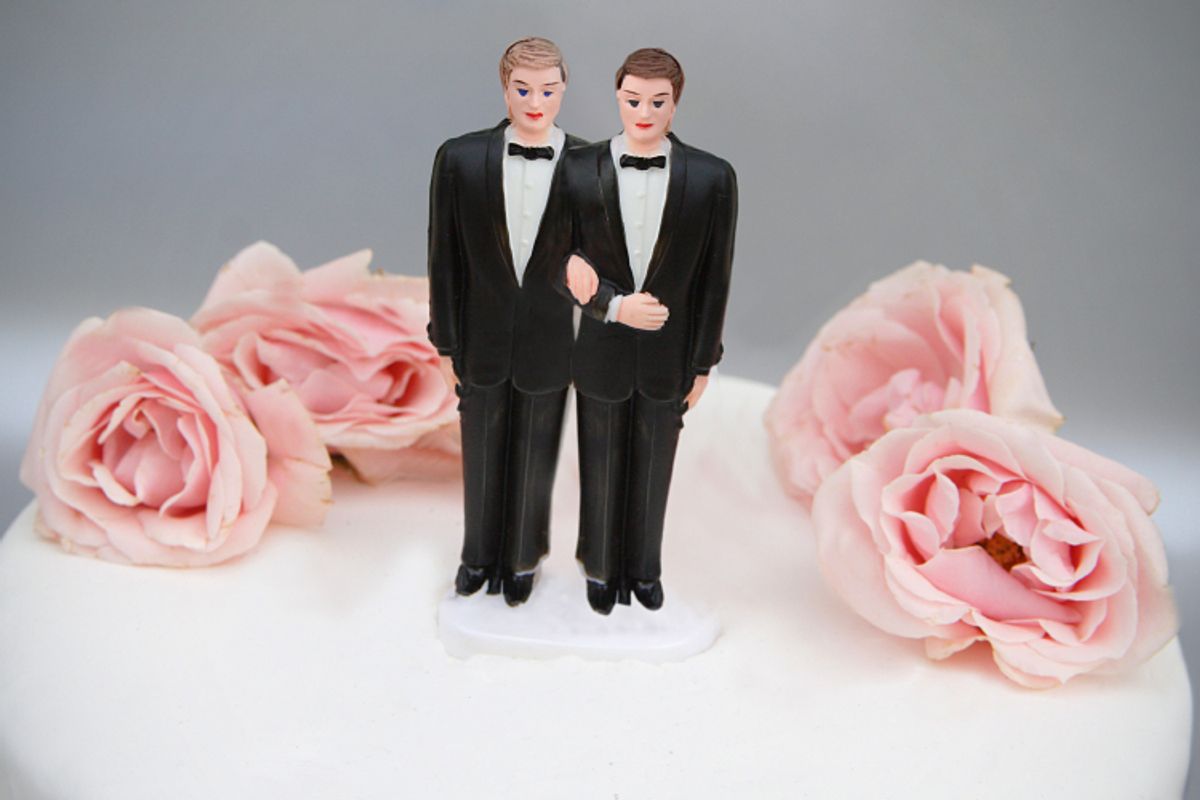Until today, I never thought I’d live to see the day that the Supreme Court would make same-sex marriage a Constitutional right. Well, maybe that’s not entirely true. Windsor v. United States declared the Defense of Marriage Act unconstitutional, in 2013, paving the way for today’s ruling, and setting off a domino effect throughout the country in which 36 states, one by one, legalized same-sex marriage. But I take nothing for granted—nothing. (Why should any of us?) Still, that's not the only reason for my shock today.
Let me explain why I'd been so wary, even cynical at times. I’m now 44. When I came out to my mother in 1986, I was 15 and paralyzed by suicidal ideations due in large part to the fact of my sexuality, for which I didn’t really have a context. Which is to say, I hadn’t consummated my desires, because I didn’t know I could. I had crushes on a few girls, but I was so terrified by the mere idea of it that I barely allowed myself to think about it in the privacy of my own brain—I thought everyone would be able to tell, because I have THE worst poker face. It’s more like a billboard. And I blush—hard. My worst fear was being perceived as lascivious (okay, it was my second-worst fear; my worst fear was of dying in a nuclear war. It was the 1980s). I certainly never imagined a girl could flirt with another girl, or possibly be flattered by another girl’s desires.
Because at the time, the words “gay” and “lesbian” were like epithets, not something you wanted associated with your name. Our male English teacher had just died of, we were told, meningitis—we later gleaned it was really AIDS, which had been in the news a lot. So now being gay came with repercussions. As for lesbians, we had … gym teachers whom we suspected were, you know, “that way”—“that way” being an expression we used back then, with a wink.
And that was pretty much all we adolescents had to go on in the LGBT-representation department, at least as far as I knew, in our suburban Chicago high school in the mid-1980s. (I later discovered that our school was quite progressive and would become home to many same-sex families. Who knew? Like I said, I didn’t.) The following year, when I was a junior, I met a girl who had just moved to Oak Park from New Jersey, and even though she wasn’t a lesbian, she was far more knowledgeable and enlightened about things gay than, well, anyone I knew. During our senior year, I made the very wise decision to come out to her. I say wise, because she immediately opened up a new world to me, loaning me Rubyfruit Jungle by Rita Mae Brown and inviting me over to watch Personal Best and Desert Hearts in the privacy of her living room.
My mind was blown. I learned something so basic and yet so important: that same-sex desire and love could indeed be consummated. So I made it my goal for college to do just that: consummate it. But first, I thought, I needed to go far away from my family and friends and start fresh so I could come out at the outset and introduce myself as a lesbian so that I would never be rejected for my sexuality by anyone I cared about. And then find a girlfriend.
And so I did: I moved to New Jersey to attend Rutgers University. I flew out of the closet from the moment my parents dropped me off. And perhaps I overcorrected because I was—I think most of my Rutgers classmates would agree—singularly identified as, well, a lesbian, for better and for worse. Which intimidated more than a few women, to the point that it took a while for me to find a girlfriend. Though I did have a prolific sex life, one that was often on the down-low—not by my choice. I managed to shed the LGBT poster-child persona when I moved to New York and started my publishing career—still, I was always out—but my prolific DL romantic life remained the same as before. Which made me miserable.
And it made it hard for me to convince my parents that my sexuality wasn’t a phase. My relationships were fleeting; there was no one special to introduce my parents to, really. Which just confirmed their assumption that most parents had made back in the day, when kids came out to their families: that being gay is the same thing as saying, “I’m not ever getting married and you're not getting grandkids, either.” As if being straight were a promise to fulfill such obligations. But to be honest, I had no reason to believe otherwise. I’d sooner have expected to become a parent than have a legally recognized spouse, though. Because during my sophomore year of college, my women’s studies professor’s partner had given birth to their son, a son they planned to have together and raise together. It was so radical—at the time.
When I met Meredith, in 2001, a few states had civil unions—that felt like the best we could hope for. She’d had a commitment ceremony with a previous partner. I often wondered if people took those seriously. I’d never been to one before until Meredith and I got together, and if couples broke up after, it was like any other breakup—awful and painful, but clean. There were no lawyers, like a divorce.
On our first date, on April 3, 2001, Meredith and I did this lesbianic thing, a version of the old U-Haul joke (what does a lesbian bring to a second date ...): We talked about wanting kids. We were both 30. That was within the realm of possibility. What we did not discuss that night was the possibility of marriage, not only because it would have been too lesbotic and ridiculous, but also because it wasn’t in the conversation. It wasn’t even an expectation.
In the four years that followed, however, we attended 20 legally recognized heterosexual weddings. And it was starting to exasperate us, and then make us angry. Not because we didn’t appreciate and love our friends and family, but because, aside from our love for each other, the only entity recognizing our bond was our bank—because we had a mortgage together.
And then, in 2010, as we started the process of pursuing an adoption for our son, we decided to elope—in Connecticut, which had just legalized same-sex marriage. New York agreed to recognize marriages from other states. We wanted our marital-like relationship to be put on record, to look even better to the prospective birth mother and have her be assured that we were a solid unit, at least in a symbolic way. Never did we expect, the following year, that our new governor would be true to his word during his campaign (who is?) and legalize same-sex marriage in the state of New York. Meredith, my wife (a word, I’m still trying to wrap my mind and mouth around), began to say, and has continued to say since that day, “You know, I really think we may see this happen in our lifetime.”
And here we are. I am genuinely astonished, verklempt, feeling all the feelings. I am even just awestruck by the huge sea change in the national attitude toward the LGBTQ community (mostly the LGB, let’s face it). But let’s just take in this huge, historic victory for a moment. Supreme Court Justice Anthony Kennedy wrote the majority opinion:
“If rights were defined by who exercised them in the past, then received practices could serve as their own continued justification and new groups could not invoke rights once denied. This Court has rejected that approach, both with respect to the right to marry and the rights of gays and lesbians.”
Thank you, Mary Bonauto and Evan Wolfson, the lawyers who stood before the Supreme Court, who are true civil rights heroes, and Supreme Court Justices Anthony Kennedy, Ruth Bader Ginsburg, Sonya Sotomayor, Elana Kagan, and Stephen Breyer. And Edith Windsor, whose case overturned DOMA. And all of the activists and lawyers and litigants who put their lives on the line, and invested so much time into making this happen today.
But while we are rejoicing, please be cautious, too. We cannot ever let our guard down. Celebrate today, keep eyes wide open tomorrow. We’ve watched Roe v. Wade get dismantled over the past 40 years. We’ve watched the Voting Rights Act get torn apart. Our rights are hard won. And they are hard kept. This is an unprecedented triumph, we’ve never experienced anything like it. Let’s do all we can to make sure we never lose what we’ve gained.




Shares